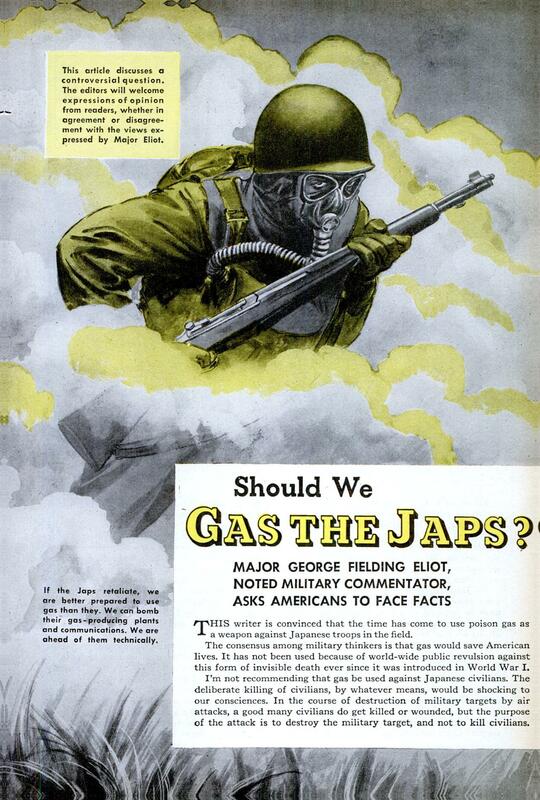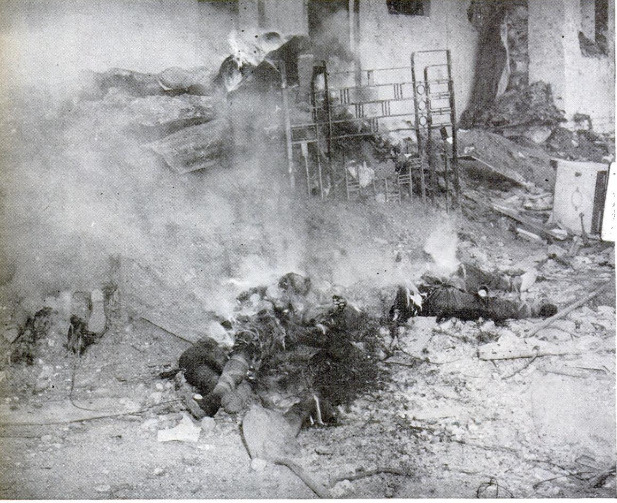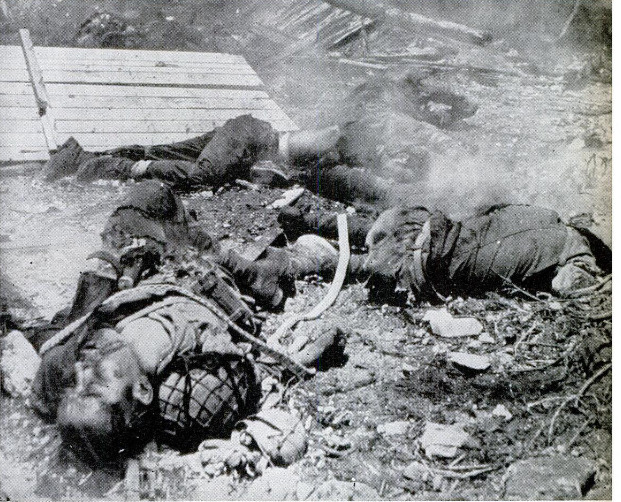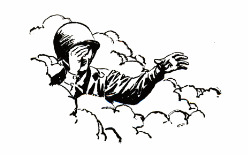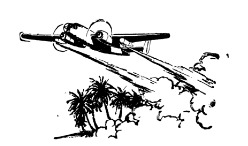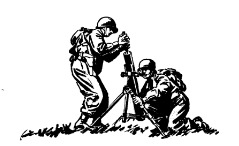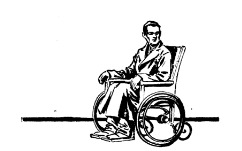-
Title (Dublin Core)
-
Should we gas the Japs?
-
Article Title and/or Image Caption (Dublin Core)
-
Should we gas the Japs?
-
extracted text (Extract Text)
-
THIS writer is convinced that the time has come to use poison gas as
a weapon against Japanese troops in the field.
The consensus among military thinkers is that gas would save American
lives. It has not been used because of world-wide public revulsion against
this form of invisible death ever since it was introduced in World War I.
I'm not recommending that gas be used against Japanese civilians. The
deliberate killing of civilians, by whatever means, would be shocking to
our consciences. In the course of destruction of military targets by air
attacks, a good many civilians do get killed or wounded, but the purpose
of the attack is to destroy the military target, and not to kill civilians,
There isn’t any international agreement to
which we are a party which bars us from using
poison gas. The last attempt at such an agree-
ment was made at Geneva in 1926, as a part
of the disarmament discussions. It was called
the Geneva Gas Protocol. But the U. S. Senate
refused to ratify it. Nor did Japan ratify it. So
we're clear on that point.
All Japanese hopes now are centered on the
price they can make us pay for victory. They
have no hope of regaining the offensive. Their
sea and airpower have been so reduced as to be
of little more than nuisance value. But they
have a strong army, composed of tough, hard-
bitten soldiers who know how to die; and they
have a defensible terrain which gives every
opportunity for stubborn yard-by-yard defense.
Few parts of Japan are far from mountains or
really distant from the sea. Their foot soldiers
and their terrain are the two main factors in
their defensive armory. So their strategy is
simple: Come and get us, and see what it will
cost you! It is the only strategy that is possible
under the circumstances.
The Japanese, in other words, have lost the
war but must yet be made to admit it. Doing
this may cost tens or hundreds of thousands of
American lives, and infinite suffering from
wounds and permanent disablements, if we have
to take Japan yard by yard as we have taken
Iwo and Okinawa. Iwo consists of only about
eight square miles, but it took us 26 days to
conquer that tiny island, and 4,189 Americans
gave their lives and 15,308 were wounded in
the process.
Under these conditions, we must certainly
ask ourselves whether it is not time to consider
once more, and very carefully, the use of chemi-
cal agents to end this war.
For some reason that I cannot comprehend,
the use of gas in warfare seems to shock the
average mind. We accept the use of incendiary
agents against Japanese cities, though we must
be perfectly aware of the extent and nature of
the casualties thus caused. We accept the use
of high explosives in all forms. We accept the
motion pictures that show us flame-throwing
tanks going into the attack on Japanese posi-
tions. But we shudder if anybody says “gas.”
Apparently, it is more humane to kill people
with third-degree burns, or by smashing their
bodies by shellfire, than it is to asphyxiate them;
apparently it is morally all right to burn them
up with flame, but wrong to sear their hides with
mustard gas. 1 don't know why, but that's the
way many people feel about it.
Let's translate this, however, into terms of
American lives and see how it looks. Let’s take
a test case: Okinawa. This island is only 67
miles long and has a maximum width of only
10 miles. But conquering it took nearly three
months and 45,029 casualties, because we had
to root out the Japanese from a terrain deeply
indented by valleys and gullies, pock-marked
with caves, and further protected by all sorts
of artificial defenses, including deep shelters,
trenches, and covered lines of communication.
We brought to bear against these Japanese
defenses the heaviest sort of concentrated fire —
by aerial bombardment, naval gunfire, artillery,
machine guns, and mortars. We proved once
more what every soldier knows: you can’t shoot
well-dug-in infantry out of positions. You have
to go in and drive them out with bayonet, rifle,
and grenade. You get a lot of your own infantry
killed doing this.
This sort of terrain prevails over most of the
Japanese islands. Japan proper has an area of
147,889 square miles, and is traversed by lofty
ranges, with summits separated by low passes
and valleys. The Japanese, in defending Okinawa.
to the last, were in effect saying to the American
people: Look at what one little island is costing
you! Are you going to pay a proportionate price
for the whole of Japan, piece by piece?
The problem will be much the same. We can
isolate one piece of Japan after another. We
can knock out the Japanese guns and tanks.
We can shoot their planes out of the air. But
we still will have to go in and dig out their
infantry — and pay the price.
Would gas help us do this job? Would it
reduce American casualties appreciably? There
can be very little doubt that it would do so.
Persistent gases are heavier than air. They sink
into valleys, caves, and deep shelters. They
reach men in positions that are perfectly pro-
tected from the blast of high-explosive shells.
They are especially adapted for just the type of
warfare with which the Japanese are now con-
fronting us.
Gas is no more the perfect weapon than high
explosives or fire. It has limitations, just as all
weapons have. It will not win the war by itself.
But it will enable us to win it at far less cost
in time and casualties.
If we use gas, of course, the Japanese will use
it, too. But the Japanese are far less technically
and industrially prepared to use gas than we are;
and their means of producing and transporting
it are subject to direct attack, to which the
Japanese cannot reply in kind. We can bomb
their gas-producing plants, the railways by
which they transport gas to the front, and the
depots behind the front in which they assemble
gas and the appliances for using it. The Japanese
are too weak in the air to do the same to us.
Would the Japanese use gas against Chinese
civilians if we used it against Japanese soldiers?
Very likely they would if they could. But the
effective use of gas is a weight-carrying proposi-
tion, and the Japanese do not have a weight-
carrying air force. They have, in fact, almost no
heavy bombers. The use of their medium
bombers to attack Chinese cities with gas would
be about as uneconomical a waste of effort as
could be imagined.
As for Japanese defensive measures, of course
they would do what they could. There is good
reason to believe that long immunity has caused
them to neglect their gas defense. Gas masks
captured in Burma and the Pacific in recent
months have been found useless because the
chemical “filters” had not been renewed. The
“gasproofing” of caves and underground defenses
is not easy, especially for a country whose
industrial plant is under heavy attack. It would
be very difficult for the Japanese to produce
something new in great quantities,
I can think of no good reason, on strictly
military grounds, why gas should not be used.
It is hard to say whether there is a psychological
or moral reason. Would our people and our allies
react unfavorably? It is hard to believe that
they would if the saving of lives was made clear
to them.
The Japanese have lost the war. The thing to
do is to get the fighting over with, to convince
the military fanatics that they must give in,
and to do this without losing any more of our
young men than is necessary. I believe the case
for the use of gas now is a strong one,
-
Language (Dublin Core)
-
eng
-
Date Issued (Dublin Core)
-
1945-08
-
pages (Bibliographic Ontology)
-
49-53
-
Rights (Dublin Core)
-
Public domain
-
Archived by (Dublin Core)
-
Sami Akbiyik
-
Marco Bortolami (editor)
 Popular Science Monthly, v. 147, n. 2, 1945
Popular Science Monthly, v. 147, n. 2, 1945

